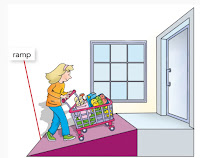Simple machine video
What is a lever?
7. MACHINES AND
ELECTRICITY
Energy: is the
ability to produce changes in an object
1.Forces
1.1 Forces move
object
Force: is an
interaction that can produce changes in motion
between 2 bodies=things
produce
Force can modify motion
stop
1.2 Forces on the
shape of objects
-
Forces attract or repel
-
Gravity
2. Simple machines
-
The effort
(E): the force we apply to move an object= load
-
The load
(L): the object we are trying to move
-
The fulcrum
(F): the point the balance where the pivot is located
Load = the object you’re
lifting. weight carga
Three classes of lever:
-
1st class lever: where the pivot is between the effort and the load. E-F-L
|
|
|
||
-
2nd class lever:where the load is between the fulcrum and the effort. E-L-F
-
The inclined plane: is
a ramp that connects surfaces of different levels
|
|
|
||
The pulley: is a wheel with a groove around rim that supports a rope.
3. The wheel and
machines
The wheel
The wheel in the ancient times: Cart, potter’s wheel
The uses of wheels;
-
Machines that help us to move
objects: wheelbarrows, cars, bicycles, roller skates
-
Machines that reduce the effort needed: cranes, lifts
-
Machines that power a rotary motion:
washing machines, dryers , drills
4. Electric charge
and electric current
4.1. Matter and electric
charge
Electric charge—— example: rub a balloon on a jumper, the
balloon have electric charge
4.2 Types of electric
charge
Positively charge
(+) Objects have more positive charge
than negative
Negatively charge
(-). Objects have more negative charge
than positive
Neutral charge. Objects don’t have an electric charge
4.3 Charged objects
4.4Electric current
An electric current
A battery
4.5 Conductors and
insulators
Conductors: are
materials that allow an electric current to pass through them. Example: metal
Insulators: are
materials that don’t allow an electric current to pass through them.
Example: wood
Glass
Plastic
5. Electric circuits
5.1 What is an
electric circuit?
An electric circuit: is a series of connected components
that allow electric current to flow through them
-
Generator
-
Cables and wires
-
Switch
-
The light bulb
5.2 Electrical
appliances
Electricity and lighting
19th century the gas lamp to illuminate streets
Candles and oil lamps to light homes
Today the electric light
You can watch this video to know what is an Atom. I hope you like it!!!
The next day, we have to answer some questions.
This is an Atom song. You can sing it.
This is an Atom
UNIT 5 MATTER AND MATERIALS
Game to review mixtures and method of separation
You can play to this game and learn each method of separation. Enjoy it!
Playing with materials
You can review with this game the origen of these materials.
Mixtures and separations
This video talks about how are the mixtures and how can you separate them.
Game change in matter
Homogenous and heterogenous mixture video
This is a cartoon episode, you can learn what mixtures and solutions are
It is a video about hamogenous and heterogenous mixture
Atoms and molecules video




























